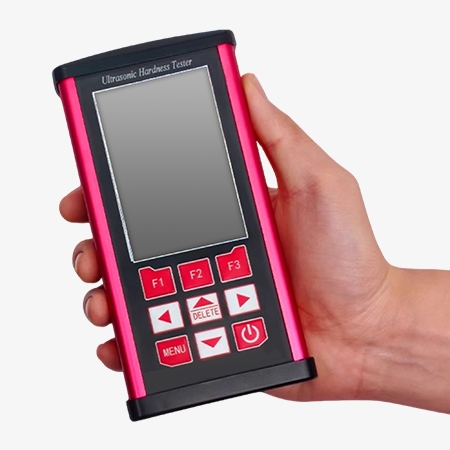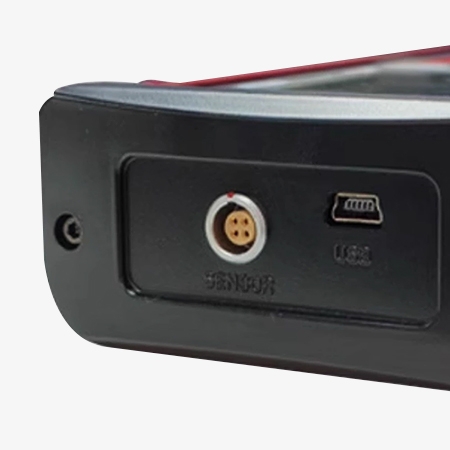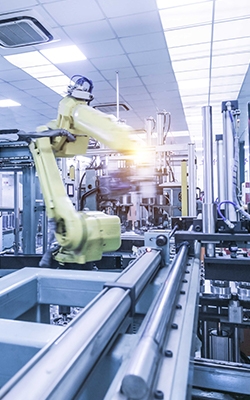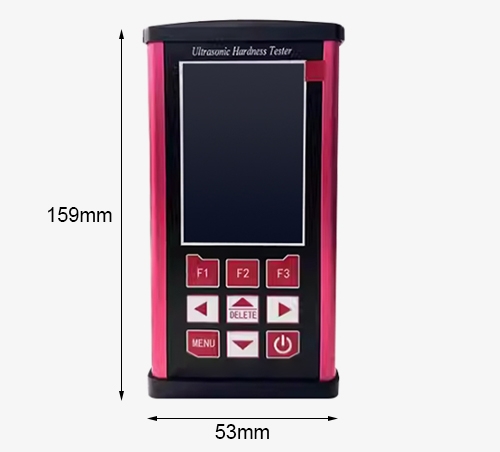An ultrasonic hardness tester is an instrument that measures the hardness of metals by using the principle of ultrasonic vibration. Unlike traditional hardness testers that require large samples or leave deep indentations, the ultrasonic type uses a vibrating probe equipped with a diamond tip to measure changes in ultrasonic frequency when it comes into contact with the test surface. The hardness tester is widely used in industries like aerospace, automotive, machinery manufacturing, and maintenance, where accurate hardness verification is critical.

Portability and Easy to Carry
- This ultrasonic hardness tester is compact and ergonomically designed, making it easy to carry and operate with one hand. Its simple interface and digital display allow user to quickly obtain accurate readings.
- An ultrasonic portable hardness tester allows engineers and technicians to perform measurements directly at the work site without the need to dismantle or transport heavy components. This is especially valuable for testing large structures, or assembled machinery that cannot be easily moved to a laboratory.

Ultrasonic Hardness Tester With USB Interface
- One of the most significant advantages of a USB interface is the ability to quickly and easily transfer test data to a computer. This eliminates the need for manual data recording, reducing the risk of human error and improving work efficiency.
- By connecting the ultrasonic hardness tester to a computer via USB, users can perform real-time data analysis using specialized software. This allows for more accurate interpretation of measurement results and the generation of detailed statistical reports or graphs.
Applications
SISCO's ultrasonic hardness testers are widely used across various industries for fast, non-destructive, and accurate hardness measurement of metals and alloys. Their primary application field is quality control and inspection in manufacturing industries such as aerospace, automotive, and machinery production.

Automotive Industry

Shipbuilding Industry

Aerospace Industry

Manufacturing Industry
| Model | SISCO-HT-XH980 |
| Measurement Direction | Perpendicular to the surface of the measured piece |
| Hardness Range/Scale | (76-618)HB, (41-105)HRB, (20.3-68)HRC, (60.7-85.6)HRA, (10-1900)HV |
| Data Storage | Max 600 groups (measurement times 1~32) |
| Measurement Results Show | Vickers (HV) + hardness scale |
| Measurable Material | Steel and cast steel, cast aluminum alloy, pure copper |
| Display | LCD display |
| Probe Identification | Automatic identification/manual setting, supports hot-xxx |
| Working Voltage | 3.7V lithium-ion battery pack |
| Charging Power Supply | 5V/1000mA |
| Communication Interface | USB 2.0 |
| Operating Temperature | 0℃~40℃ |
| Storage Temperature | -20℃~75℃ |
| Relative Humidity | ≤85% |
| Dimension | 159*83*39mm (main unit); φ22*141mm (probe) |
| Weight | About 3.25kg (a whole set) |
Dimension:

Q1: What is an ultrasonic hardness tester?
A1: An ultrasonic hardness tester is a portable device used to measure the hardness of metals and other solid materials using ultrasonic contact impedance (UCI) technology. Instead of making a large indentation like traditional Rockwell testers, the UCI method measures the frequency shift of an ultrasonic vibration applied through a diamond-tipped probe pressed into the material's surface.
Q2: What materials can be tested using an ultrasonic hardness tester?
A2: An ultrasonic hardness tester can evaluate a wide range of materials, including metals and alloys. Commonly tested metals include steel, aluminum, copper, and their various alloys. It is especially useful for assessing surface hardness, case-hardened layers, and thin coatings without causing deep indentations.
Q3: What are the maintenance requirements of the ultrasonic hardness tester?
A3: The ultrasonic portable hardness tester is a precision instrument, and proper maintenance is crucial for ensuring accurate and reliable measurements. First, regular cleaning is essential. The probe, test surfaces, and instrument body should be wiped with a soft, lint-free cloth. Avoid harsh chemicals that could damage sensors or electronic components. And then, environmental care matters. The tester should be stored in a dry, dust-free environment, avoiding excessive heat, moisture, or vibration. Sudden temperature changes can affect ultrasonic wave propagation, leading to inconsistent results.
Tips: How does the ultrasonic hardness tester perform on rough or uneven surfaces?
Ultrasonic hardness testers rely on the propagation of high-frequency sound waves through a material to estimate hardness. On smooth, flat surfaces, this process is highly accurate because the ultrasonic signal can transmit and reflect consistently. However, when measuring rough or uneven surfaces, performance can be affected. Surface irregularities, such as pits, scratches, or curvature, can scatter or absorb the ultrasonic waves, leading to inconsistent signal transmission. This may result in slightly lower accuracy or greater variability in readings compared to measurements on polished surfaces. On rough or uneven surfaces, careful preparation, proper coupling, and multiple measurements are recommended to maintain reliable results, though minor deviations may still occur.
Thank you for buying industrial test and measurement equipment on SISCO.com, all products sold by SISCO and the partner cover a 12 months warranty, effective from the date of receiving the products.
What is covered?
SISCO is responsible for providing free spare parts, and free technical support to assist the customer to repair the defective products until the problem is solved.
What is not covered?
- Product purchased from anyone other than a SISCO store or a SISCO authorized reseller.
- Expendable parts.
- Routine cleaning or normal cosmetic and mechanical wear.
- Damage from misuse, abuse or neglect.
- Damage from use of parts other than SISCO approved.
- Damage from use outside the product’s usage or storage parameters.
- Damage from use of parts not sold by SISCO.
- Damage from modification or incorporation into other products.
- Damage from repair or replacement of warranted parts by a service provider other than a SISCO authorized service provider.
- Damage caused by the application environment not meeting the product usage requirements and the failure to perform preventive maintenance.

